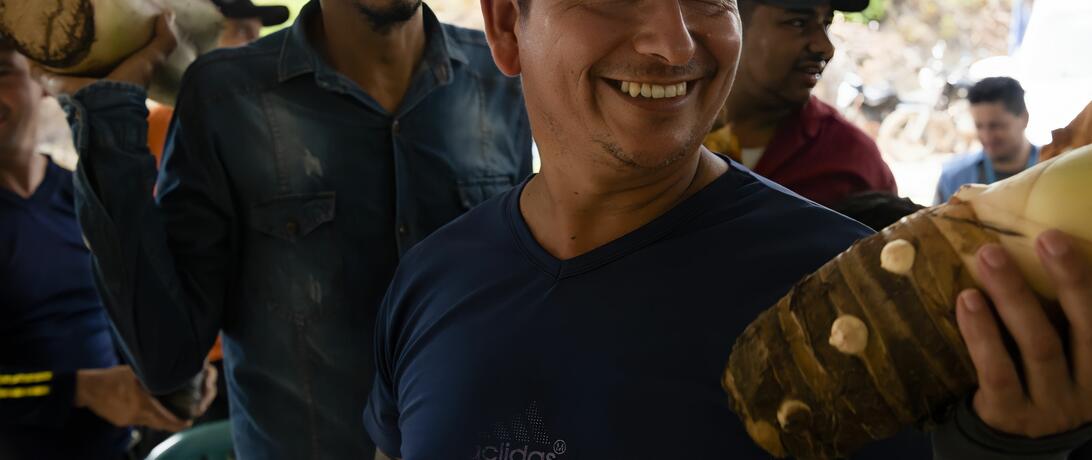
Campesino and excombatant cooperatives join the Catatumbo Peace Network to promote collaborative work and commercial networks of their productive projects from different municipalities in the region.
The Catatumbo Peace Network brings together campesinos (rural peasant) cooperatives that have replaced illicit crops and the ex-combatant population in order to build their organizations and increase their product marketing channels. The first meeting of this network, which includes seven Catatumbo cooperatives, was held with the support of PASO Colombia, Francisco de Paula Santander University-Ocaña, and the UN Verification Mission in Colombia, and allowed participants to share their experiences in building a complete peace for their territory.
The cooperatives linked to the network are currently developing various agricultural projects, including buffalo breeding, poultry production, and pig breeding, among others. However, one difficulty they face is access to local or regional markets, either because of infrastructure or mobility issues, or lack of trust among the local community. For this reason, with PASO's support, it was identified that the commercialization axis of the Catatumbo Peace Network is essential to provide sustainability to the various productive projects and space for new initiatives.
SHARING SUCCESSFUL EXPERIENCES
The representatives of the cooperatives visited the AGROINCAT biofactory during this first meeting, a space organized by women who participated in the Contingency Plan in Support of Ex-Coca Growers Families, where they currently produce artisanal animal feed and biofertilizers. Despite having to halt operations due to the pandemic, AGROINCAT participants were able to reopen the biofactory in 2021 and have since concentrated on the production of these artisanal concentrates.
"We conducted the test ourselves and learned from our errors. We used our animals to test the first bundles [of feed] to see if they liked it, how they were doing, and if they would work. We had our ups and downs, but we worked through them and succeeded," says Sandra Durán, an association member. Now that they've shared their knowledge with other cooperatives, they insist on the advantages of artisanal recipes: "Not only are they cheaper, but you can see how the animals grow more beautiful, and the meat is much better when it's time to sell them."
AGROINCAT produces 200 kilos of concentrates per month under the VETCA brand, which are sold primarily to members of the cooperative and other local sales.
Thanks to these lessons learned, AGROINCAT has complemented the production of concentrates with the planting of crops that serve as raw materials for these foods. It has also been able to produce biofertilizers using microorganisms from the local forest, a product that has also been tested within their farms. In the words of Robinson Ariza, an associate of AGROINCAT, "When you're used to using "triple quince" (a local fertilizer) to improve the soil, you'll notice the difference when you switch to this [biofertilizer]. I'm not saying you'll see results in two days, but with persistence, the bush will become more beautiful, and you won't be harming yourself with chemicals ".
“We tried a few years ago and failed, but now we see your success and are re-encouraged. We admire your work. I leave this space feeling very motivated, and this is what peace has taught us," said Jair Villamizar, member of COODEPAZ, at the end of the meeting."
“WE AREN'T AT PEACE YET, BUT WE CAMPESINOS CAN MAKE IT HAPPEN.”
Three of the Catatumbo Peace Network cooperatives have made progress in their agreements to jointly build another biofactory in the municipality of El Tarra, based on the successful experience of AGROINCAT's biofactory. Ricardo Murillo, a professor at the Universidad de los Llanos, gave one of the meeting's training sessions, emphasizing the importance of productive reforestation, which provides the ingredients for these recipes. "We were coca "raspachines" (coca workers) and now we are food "raspachines," one participant said animatedly in response to the explanation of how to use the leaves of the cassava or blackberry crops. El Tarra's future biofactory will be equipped with the necessary equipment to produce these artisanal animal feed and will have the technical support of PASO Colombia, led by Murillo and other professionals.
Just as the participants recognized with alarm that the price of the industrial fish concentrate has risen three times in the first quarter of the year, they were able to see in VETCA's artisanal production an alternative to keep their agricultural projects afloat. As a result, the meeting allowed for discussions about opening new sales and support channels among their various production units. According to Claudia Paola Salcedo, a PASO expert, the network should propose sales strategies based on short marketing circuits, overcoming the challenges that excombatants face in selling their products in the communities surrounding their new settlements. This strategy aims to have a positive impact on the region's social fabric, which is still afflicted by security issues and illicit economies but has been prioritized among the various plans of rural development institutions.
Article Details
Published
Topic
Program
Content Type
News